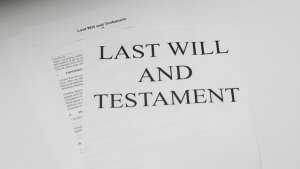Case Law: Dementia-Induced Mild Cognitive Impairment

Contact
Table of Contents
Introduction
Dementia is a harsh reality for increasing numbers of families. Sadly, it means the disputed wills solicitors at Osbornes Law are seeing greater numbers of will challenges following the death of a dementia sufferer – their capacity to make a will being called into question.
Reassuringly, the courts do not tend to readily conclude the individual had dementia to such an extent that they lacked the necessary mental capacity to make a will. In a recent case, a testatrix suffered severe dementia by the time of her death – but the judge decided her will be made following the diagnosis was valid.
Boult v Rees (Re Estate of Tilly Clarke) [2023] EWHC 147
Tilly Clarke was 90 when she died in March 2019 with severe vascular dementia, leaving a modest estate of around £225,000. Tilly made her will in 2013 appointing her only child, Roger, as executor and the sole beneficiary; and if he died first – one of her nephews (Danny) and his wife would inherit her estate. Roger died of cancer in 2015.
Following Mrs Clarke’s death, one of her nieces claimed Mrs Clarke lacked the capacity to make her will.
The outcome of the niece’s claim would be significant: if the will was indeed invalid, Mrs Clarke would have died intestate with her estate passing to her next of kin under the statutory intestacy rules. This would entitle all her surviving nieces and nephews to an equal share of her estate – and Danny’s inheritance would be significantly diluted (his wife would not be entitled to anything).
In capacity cases, the courts look at the factual background around the making of the will to decide whether, on balance, the individual had testamentary capacity.
Diagnosis
There were initial indications of problems with Mrs Clarke’s mental health at the start of 2013 (mostly mild cognitive impairment and headaches). Dementia was diagnosed in March following a scan but she had no further contact with doctors until the following year.
Meanwhile, in May 2013 Mrs Clarke instructed solicitors to prepare her will. This was executed and witnessed by the solicitor and a secretary. Where a solicitor suspects their client may not have testamentary capacity to make a will, they are expected to follow the Golden Rule – a rule of good practice where a doctor is asked to conduct an independent capacity assessment and certify that the individual has testamentary capacity.
Mrs Clarke’s solicitor said in evidence he had no reason to request a medical report, “or even consider it”, as he had no doubt as to her capacity at the time. An expert psychiatrist also told the court that in his experience people with relatively mild degrees of cognitive impairment often have sufficient understanding to be able to make a will, and nothing in her medical records suggested Mrs Clarke had been delusional.
The judge found the will was rational on the face of it; there was nothing suspicious about the identity of the beneficiaries; and she was able to understand the nature and implications of her will.
Although he found that there was some doubt in view of her dementia diagnosis, it was not enough to show on balance that Mrs Clarke lacked testamentary capacity.
What does this mean?
Depending on its form, dementia progresses differently from one person to the next. But this ruling makes clear that mild cognitive impairment does not, in the absence of other evidence suggesting otherwise, raise sufficient concern around the individual’s testamentary capacity.
Where someone is seeking to cast doubt on the will-maker’s mental capacity to make a will due to dementia, Alzheimer’s or other mental health reasons, there must be sufficiently weighty evidence for the will to be declared invalid.
Suggested reading:
- What Happens if Someone has Dementia and No Power of Attorney?
- How to prevent a loved one entrusting their affairs to the wrong person
How can we help?
The disputes wills team at Osbornes Law appreciates how distressing these cases can be. We are experienced in advising clients on both sides where the veracity of a will is being contested.
To speak with one of our solicitors, contact us by:
- Filling in our online enquiry form; or
- Calling us on 020 7485 8811
Share this article
O echipă profesională.
Va recomandam cu incredere sa apelați la serviciile Doamnei Avocat Maria Tiron.
Va multumesc pentru ajutorul acordat.A range of services for tenants, and a strong track record acting for especially vulnerable clients
Rob identifies issues quickly and swiftly, and works through them efficiently
“Nicola Hall assisted me on a recent negligence case. I found her helpful, informative and had complete confidence in her ability in getting the outcome I so rightly deserved. I would highly recommend Osbornes Law for any legal matters.”
Jan Atkinson is confident with a straightforward approach. Her practice covers both contentious and non-contentious matters, including wealth planning and estate administration.
More Insights about Contesting a WillVIEW ALL
- 9.6.2023
High profile probate dispute of Vladimir Scherbakov
Probate dispute of Russian billionaire’s missing will You’d imagine a wealthy businessman with assets in different countries would...
Read more - 1.3.2023
How to prevent someone contesting a will
It is fairly rare in my experience for a parent to write a child out of their will but that...
Read more - 27.10.2022
Contesting A Will Case Studies
Will dispute on grounds of lack of capacity Our contesting a will solicitors acted for the claimants, the adult daughters...
Read more - 20.10.2021
Evidence Needed When Contesting A Will
‘Scrap King’ Multi-million Inheritance Dispute Confirms the High Standard of Evidence Needed to Contest a Will Gary Goodwin, son of...
Read more - 20.10.2021
Understanding Testamentary Capacity
What is testamentary capacity? Testamentary capacity refers to a person’s legal and mental ability to create a valid will....
Read more - 20.10.2021
Unsuccessful Inheritance Act Claim
The case of Shearer v Shearer The recent reported case of Shearer v Shearer highlights that adult children cannot expect...
Read more - 13.8.2021
What is reasonable financial provision in 1975 Act claims?
Understanding “Reasonable Financial Provision” “Reasonable financial provision” under the Inheritance Act 1975, refers to the financial support that is reasonable for...
Read more - 9.10.2020
Undue Influence in Wills
What is Undue Influence in Wills? Undue influence occurs when someone pressurises another person to change their Will to gain...
Read more - 2.9.2020
Left Out of a Will: What Can I...
I was left out of my parent’s will. What can I do? Understanding Your Situation Whilst testators in England...
Read more









